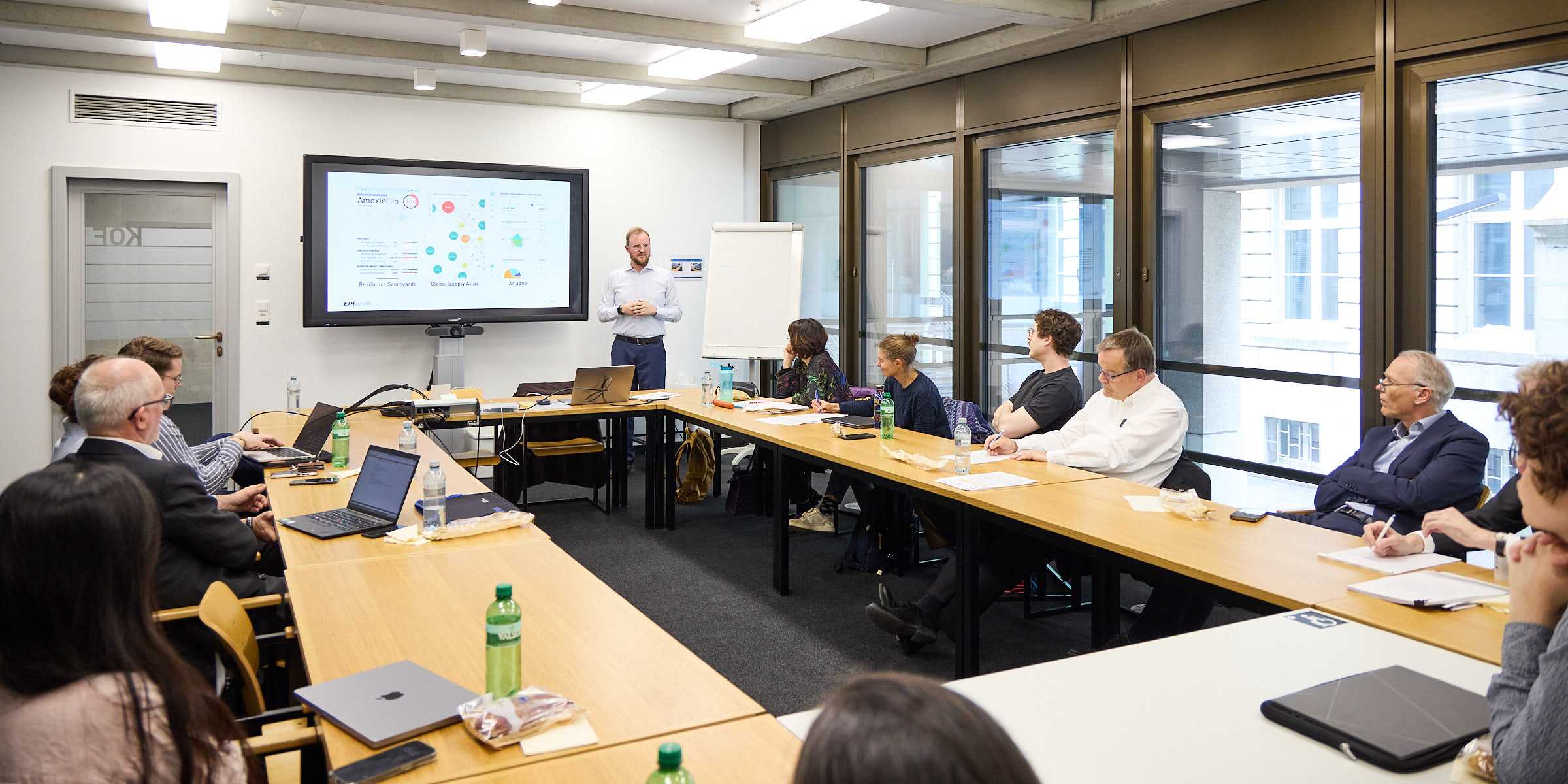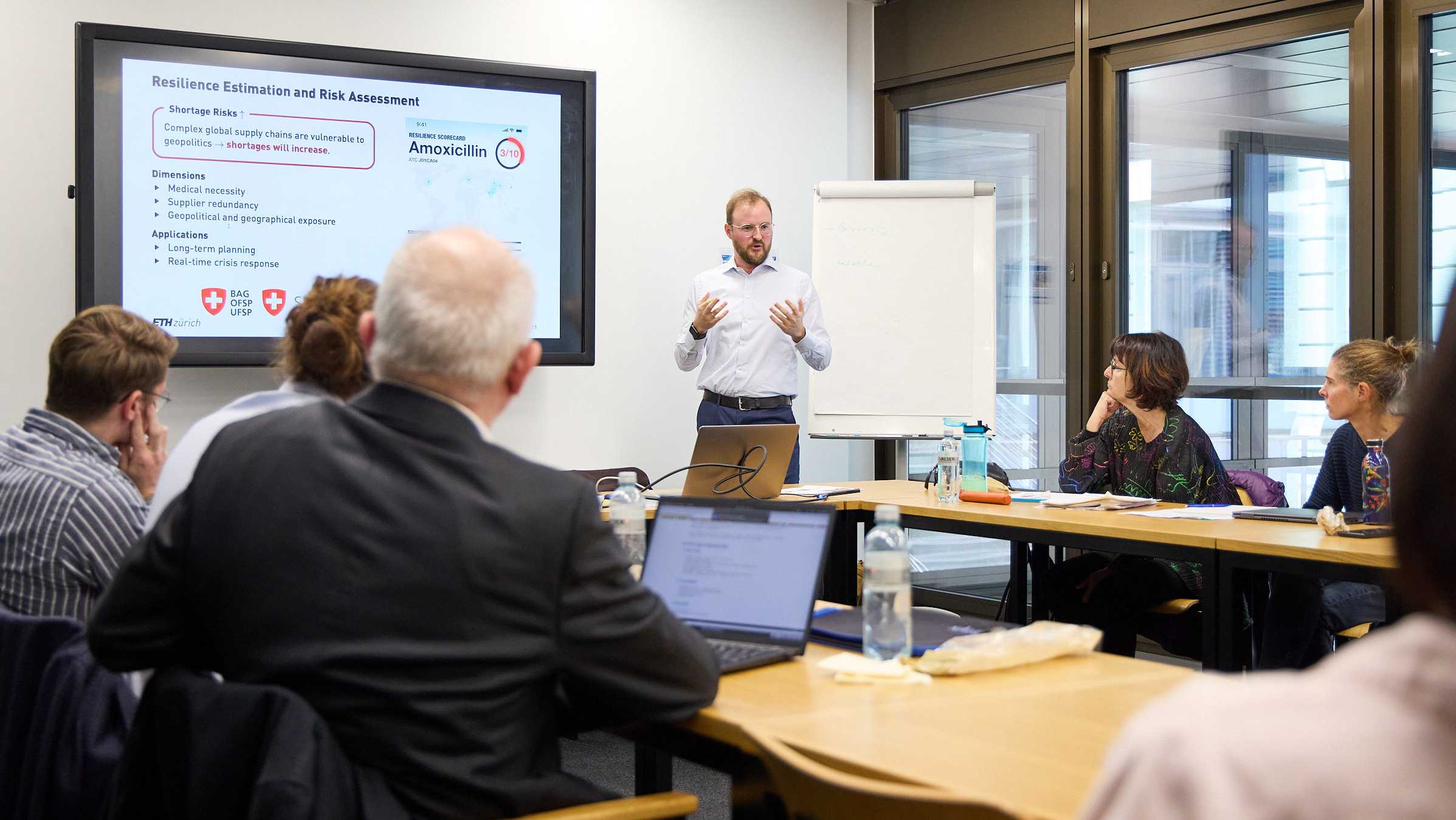
Launch of D-MTEC’s new hub
for collaborative and translational research:
Pharmaceutical supply chain resilience
at the PPGM ColLab
With vibrant discussions and a collaborative atmosphere, the newly established Center for Public-Private Governance and Management (PPGM) celebrated the launch of its Collaboration Laboratory (PPGM ColLab). Nearly 20 participants across D-MTEC attended the inaugural lunchtime event on 7 May. Among them were Professors Robert Perich and Ursula Renold, directors of the PPGM, alongside Professors Hans Gersbach, Jan-Egbert Sturm and Frank Schweitzer.
Introducing the PPGM: Bridging theory and practice
Professors Robert Perich and Ursula Renold opened the event by underscoring the importance of evidence-informed policymaking. They introduced the mission of the PPGM: to develop practical, evidence-based solutions for governance and management at the intersection of the public, private, and non-profit sectors.
Launched by D-MTEC professors, the PPGM is a dedicated centre that harnesses departmental synergies to address real-world challenges, focusing on four core areas:
- Practical relevance: Working closely with public- and private-sector partners to co-create solutions that drive evidence-based reform.
- Interdisciplinary approach: Drawing on expertise in economics, technology, and management to tackle complex problems in public and non-profit organisations – including through innovative uses of AI.
- Translational research: Turning foundational research findings – theoretical or empirical – into actionable strategies that bridge the gap between academia and practice.
- Knowledge transfer: Sharing research through continuing education, public events, and outreach tailored to a broad audience.
The centre remains open to collaborations with internal and external partners – both nationally and internationally – to further its impact.
Launching the PPGM ColLab: Strengthening research collaborations
The PPGM ColLab was introduced as an innovative initiative designed to stimulate cross-disciplinary research collaborations, leverage expert knowledge across D-MTEC chairs, and connect researchers with practice-oriented solutions to overcome the “Valley of Death” – the critical phase where promising research struggles to gain traction beyond academia.
“The PPGM ColLab aims to translate research at D-MTEC into practice. This requires an interdisciplinary discourse within D-MTEC, enabling early-career researchers to expand their networks and benefit from the guidance of experienced faculty members.”Professor Ursula Renold, Chair of Education Systems and Co-Director PPGM
At the launch event, Dr Luca Verginer from the KOF Swiss Economic Institute presented the project “Enhancing Pharmaceutical Supply Chain Resilience”, developed in collaboration with Professor em. Frank Schweitzer, Dr Georges Andres, and Dr Giona Casiraghi. They shared insights from their journey from foundational research towards translational impact.
Addressing global pharmaceutical supply challenges
Their research tackles pressing global concerns around pharmaceutical supply chain vulnerabilities, including drug shortages caused by economic pressures, IP constraints, and sudden demand spikes. They underscored the risks posed by the geographic concentration of production and heavy import dependencies.
To address these issues, the team developed three key tools:
- Resilience Scorecard: An empirically based planning and crisis-response tool for decision-makers.
- Global Supply Atlas: A knowledge graph that maps hidden supply dependencies and explores strategies such as nearshoring and international coordination.
- Ariadne: A real-time data-sharing and tracking initiative proposing a pharmaceutical resilience alliance to improve crisis responsiveness.
Engaging discussions and open questions
The presentation sparked lively discussions on critical issues including pricing, contracting complexities, ownership concerns, and geopolitical factors such as potential economic decoupling from China and the impact of US tariffs. Further discussed were challenges related to simulation accuracy, given data limitations, and practical barriers Swiss pharmaceutical companies face when expanding internationally.
Next steps: Collaboration and scaling Up
Looking ahead, the researchers plan to broaden their collaboration network to include experts from pharmaceutical manufacturing and chemistry, aiming to further refine and scale their prototypes. To ensure research translates effectively into practice, they stressed the importance of distinguishing between academic inquiry and consultancy-driven questions. Encouragingly, they found enthusiastic support from attending professors, who offered both guidance and dissemination channels to amplify their outstanding work. The team also addressed critical issues like data ownership and sustainable platform financing.
“The workshop was helpful for gathering feedback from colleagues and senior faculty. It opened up honest conversations about persistent challenges, like finding the right channels to engage policymakers and securing funding.”Dr Luca Verginer, KOF Swiss Economic Institute
Join the next PPGM ColLab event!
The successful launch of the PPGM ColLab underscores the strong potential for interdisciplinary collaboration at D-MTEC. It offers a vital forum for researchers to explore how their work can inform real-world decision-making. The next PPGM ColLab is scheduled for 13 August 2025, including a presentation on the topic “Integrating digital diagnosis in healthcare supply systems in low- and middle-income countries”. D-MTEC faculty and researchers are warmly invited to present their projects and engage in these practice-oriented dialogues.
Interested participants and prospective presenters are encouraged to contact Dr Ladina Rageth at to take part in this exciting new collaborative initiative.
References
Amico, A., Verginer, L., Casiraghi, G., Vaccario, G., & Schweitzer, F. (2024). external page Adapting to disruptions: Managing supply chain resilience through product rerouting. Science Advances, 10(3), DOI: 10.1126/sciadv.adj1194




